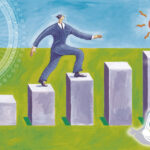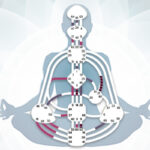Let’s talk about the main traps of open Ego Center.
The Centers in Human Design are not just “nodes” of concentration of inner energy, but also places where the False Self is formed and manifested. And among all the Centers, it is the Heart Center that manifests itself most strongly, both at the level of the True Self and the False Self.
It is very easy to fall under the influence of False Self, since it always manifests on the mental level, and we tend to trust every thought we have, regardless of its quality. Even more – it is the self-destructive, destructive attitudes that are much more evident in our personalities, because they directly encroach on the most “precious” thing that each person has – his or her Ego.
Let’s take a brief look at exactly how the False Ego can express itself, manifesting itself in the indeterminate Heart Center.
Negative Comparisons
At the outset, let’s talk about what occurs most often: comparisons. It’s worth noting right away that when we talk about the human Ego, comparisons are almost impossible to avoid. Thoughts that our neighbours have a better place to live/car/vacation come to all of us in one form or another, and in our thoughts we inevitably end up on the “losing” side. After all, few people in today’s world will think about how lucky they are compared, for example, to a homeless person forced to squirm in poverty and struggle daily to live. On the contrary, we always set ourselves up a priori at a higher level than where we are.
In the case of the indeterminate Heart Center, what matters most is not exactly what the comparison is, but what the person does with those thoughts next. For example, if a husband were to say that his mother cooked better than his present wife, this would invariably be a lever for the latter to let her False Self off the chain. And then she will take the resulting negativity either to her husband, reproaching him, or to herself for not being able to reach the desired “bar”. By the way, if the Heart Center were identified, this woman would try to prove that she cooks better, using this stimulus as a “challenge.”

But if we consider this same situation in terms of the “environmentalism” of the relationship in our hypothetical family, then immediately after the negative comparison, a positive attitude would have to follow. Like, “My mother may have cooked better, but compared to her, you’re doing just fine with the cleaning. Thereby, it was as if he “equalized” the positive and negative aspects.
Dependence on Positive Evaluations
Next, let us consider a classic problem that can be found in almost every family – the problem of dependence on positive evaluations. Despite the fact that it is found in practically everyone, it is most strongly and negatively manifested in people with an indeterminate Heart Center. The point is that since childhood, many people develop a wrong perception of themselves due to the fact that they are used to hearing something good about themselves only after they have done something conditionally positive. For example, children are praised only when they get positive grades in class, and if they get bad grades, they are scolded. Or, for example, a young man hears words of gratitude from his beloved only when he gives her something or does something significant for her.
So people develop a very destructive self-perception pattern – that if they want to be treated well, they have to go out of their way to get it. And being deprived of such nourishment in the form of someone else’s appreciation, they start to unnecessarily dig inside themselves, wondering what they have done wrong.
An imposed sense of duty
Another tool of the manifestation of the False Self in the indeterminate Heart Center, also indoctrinated into a person since childhood. For example, if parents start from an early age to impose on their child certain duties, which he must fulfill at any cost. And if he does not do this, he will be reproached or even punished. These “duties” can be different, whether it’s taking out the trash every day or having to come home at a certain time every day. And while for people with a certain Heart Center such a thing will not cause the formation of any negative attitudes, in the case of an indefinite Center, it is quite different.
For the latter, any “duties” imposed on them will be a priori perceived as a kind of punishment. It is as if their right to freedom is ignored and they are forced to do what they do not want to do. As they grow up, they will do everything in their power to ignore the demands that are placed upon them by others. By violating them, they show protest, as if they are “rebelling” against the hostile world around them, which imposes something on them. Moreover, they often do not understand why they do not want to do what is required of them.
The Need to Prove
Another tool of the manifestation of the False Self in the indeterminate Heart Center is the need to constantly prove something to someone. The point here is that one stops appreciating oneself for who one really is by trying to “praise” oneself. Whether it’s trying to flaunt knowledge on a topic he knows nothing about, or attracting unnecessary attention to himself while in a group of friends. Very often it happens that, falling into this trap, people initially adopt a “defensive” posture, reacting aggressively even when it is not necessary. For example, even on an ordinary friendly joke, they may overreact seriously, provoking a conflict with the “offender.

What is interesting is that this problem is closely related to the presence of other undetermined Centers. For example, if only the Ego Center is undetermined, then the person will try to defend their status or place in the hierarchy of the group. If the Throat Center (responsible for self-expression) is not identified, then the person will try to express himself/herself in a role which is not peculiar to him/her but which he/she would like people to see him/her in.
Excessive focus on the material aspect
This problem has become especially acute in our time – the time of social networks and the so-called “cult of success. Everywhere you look, from everywhere are trying to impose the “right” way of life – money, cars, expensive clothes and a cool vacation. And with few exceptions, no one thinks about the fact that you should be a happy person, not a successful one. For people with an uncertain Heart Center, this becomes a real torture. Looking from the outside at the success of others, they begin to doubt themselves – their values and ideals, their goals and desires. And in the most neglected cases, they give up what would bring them real pleasure, betraying their own souls in an attempt to achieve the ideals imposed on them from the outside.
For example, there are many very successful (looking from the outside) businessmen who are deeply unhappy at heart because they have lost their own way. They keep running around in circles like squirrels in a wheel, trying to make more and more money, while at the same time moving further and further away from their own nature. Who can say, with full confidence in his heart and soul, that he would much rather make millions by selling something than barely make ends meet by painting pictures, as he once dreamed of doing as a child? The voice of Mind will no doubt incline to the first option, even if the soul begs to choose the second.
That is why the main task for every person with an uncertain Heart Center is to learn to ignore “promptings” of his mind, trusting his heart and going, albeit hard, on his own, his own way, destined only by him.
If you were interested in this article and would like to know more about the Centers’ work in Human Design (or about this teaching itself) in more detail – go to the website link. There you will find a lot of useful and interesting information that will make you if not completely change your life, then at least look at it from a completely different angle.
A full decoding of your chart in pdf format is available here.



